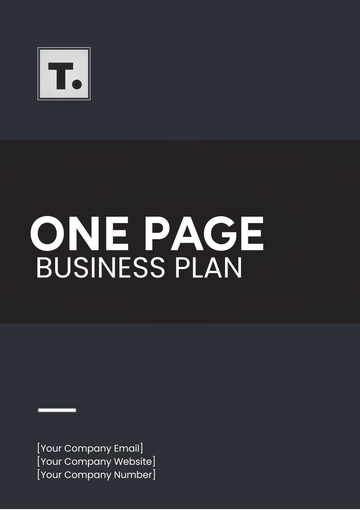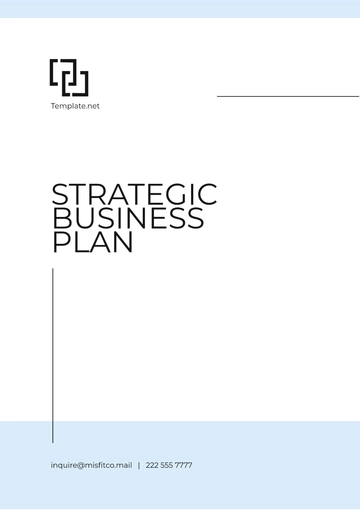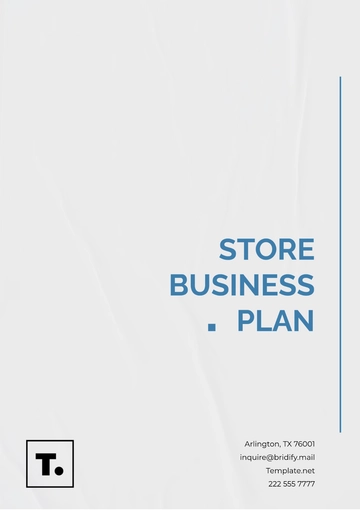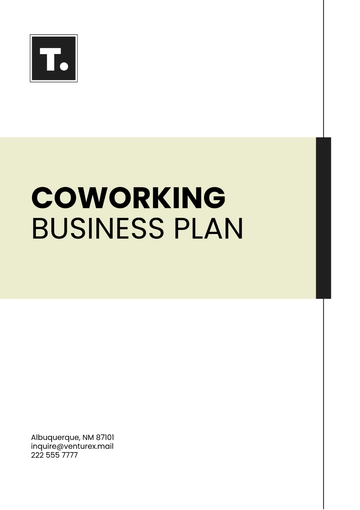Free Solar Energy Business Plan
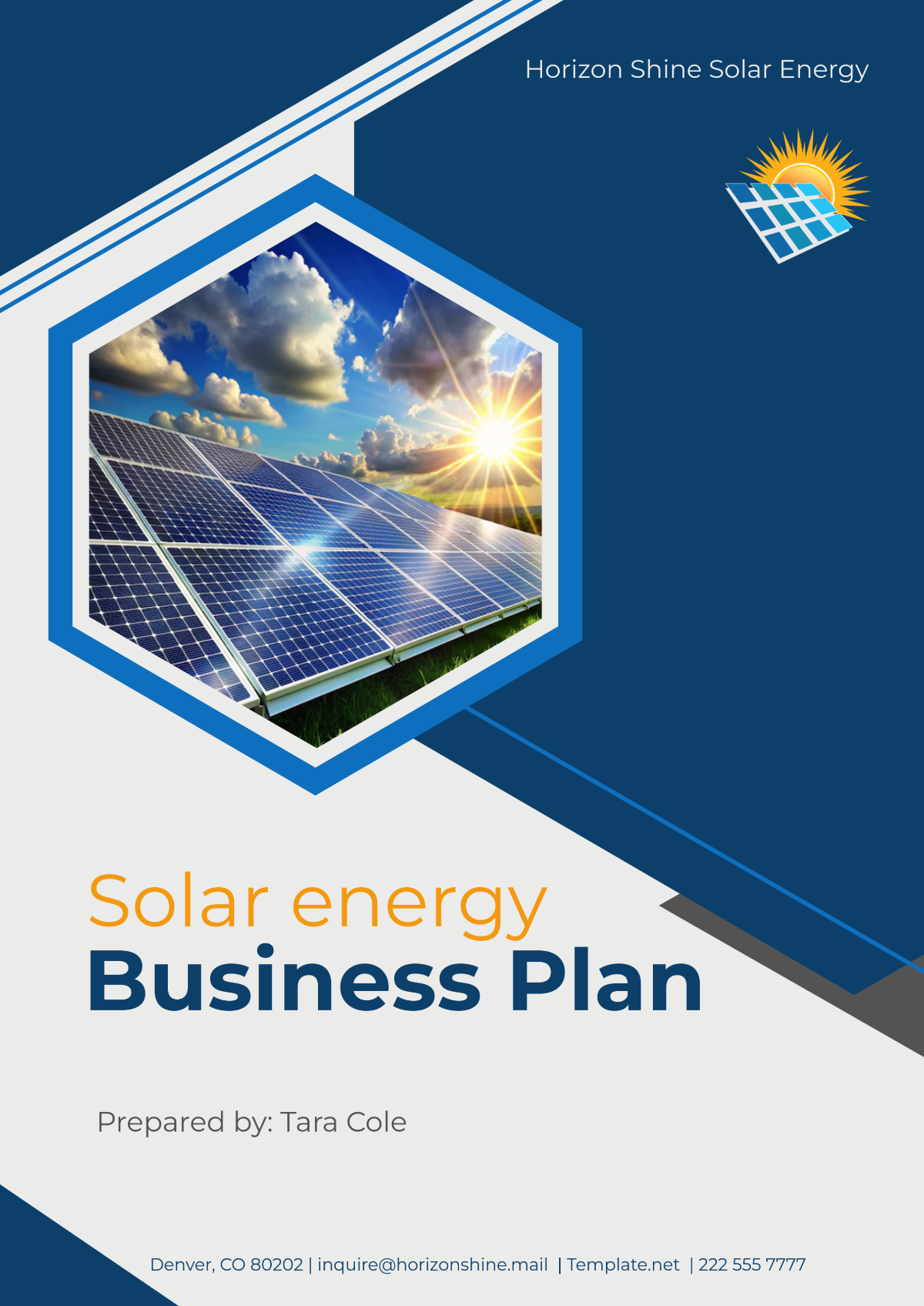
I. Executive Summary
A. Business Overview
[Your Company Name] is a forward-thinking renewable energy company dedicated to harnessing the abundant power of the sun to provide sustainable and affordable energy solutions to a wide range of customers. With the escalating need for clean energy sources in the face of climate change and resource depletion, solar energy has emerged as one of the most viable alternatives to fossil fuels. Our business is strategically positioned to install, operate, and maintain solar power systems tailored to meet the diverse needs of residential, commercial, and industrial clients across various geographical regions.
By the year 2060, [Your Company Name] envisions becoming a recognized leader in the solar energy sector, making significant contributions to global energy needs while actively participating in the reduction of carbon emissions. Our primary focus is on delivering high-quality solar panel installations, providing maintenance services, and offering energy consultancy to help our clients optimize their energy consumption and maximize their savings.
Our mission is clear: to drive the widespread adoption of solar energy by providing innovative and cost-effective solutions that are accessible to everyone. This business plan outlines our market strategy, operational structure, financial forecasts, and growth roadmap for the next [30] years, ensuring a sustainable and profitable future for both the company and our customers. By laying out a comprehensive strategy, we aim to achieve our vision and mission in a manner that is economically viable and environmentally responsible.
B. Vision and Mission
Vision: To be a global leader in solar energy by 2060, providing innovative and sustainable energy solutions to power a cleaner, greener future for all.
Mission: Our mission is to make solar energy accessible, affordable, and reliable for individuals and businesses alike. We are committed to contributing to global efforts to reduce carbon emissions and combat climate change. By delivering dependable, efficient, and environmentally-friendly energy solutions through advanced technology, customer-centric service, and continuous innovation, we aspire to become a trusted partner in our customers' journey toward energy independence and sustainability.
C. Goals and Objectives
Short-term goals (next [5] years):
Establish a market presence in [10] key regions, focusing on areas with high solar potential and supportive government policies.
Install [50,000] residential solar panel systems, enabling homeowners to significantly lower their electricity costs and environmental impact.
Collaborate with [100] businesses for commercial solar installations, facilitating their transition to renewable energy and helping them meet corporate sustainability targets.
Reach annual revenue of [$50 million], positioning [Your Company Name] for sustained growth and expansion.
Long-term goals (by 2060):
Become a leading solar energy provider with operations in [50] countries, expanding our reach to meet the global demand for renewable energy.
Install solar systems with a combined capacity of [1,000 MW], contributing to the transition toward a sustainable energy future.
Reach a revenue target of [$1 billion], allowing for reinvestment in research and development, customer service, and market expansion.
Reduce carbon emissions by over [5 million metric tons] annually, aligning our operations with global sustainability goals and enhancing our corporate social responsibility profile.
II. Company Description
A. Company History
[Your Company Name] was founded in [2050] by a passionate group of entrepreneurs who recognized the urgent need for renewable energy solutions in an era of climate crisis. With a shared vision of creating a sustainable future, the founders set out to establish a company that would provide affordable, high-quality solar solutions to meet the increasing global energy needs. Our inception was marked by a commitment to innovation and customer satisfaction, values that remain central to our operations today.
Since its inception, [Your Company Name] has undergone significant growth, expanding its operations from a small local business to a recognized brand in the renewable energy industry. We have successfully completed over [1,000] solar projects, encompassing a diverse range of installations, from small residential systems to large-scale commercial and industrial power systems. Our dedication to quality and service has garnered positive reviews and repeat business, allowing us to build a strong reputation within the communities we serve.
B. Legal Structure
[Your Company Name] is registered as a Limited Liability Company (LLC). This structure provides several advantages, including liability protection for the owners and flexibility in management and tax treatment. The LLC structure is particularly beneficial for a growing business in the renewable energy sector, as it allows for easier adaptation to changes in the market and regulations while safeguarding the personal assets of the founders and stakeholders.
C. Products and Services
Residential Solar Panel Installation:
We offer comprehensive turnkey solar panel installation services for homeowners, which include an initial consultation, detailed energy assessments, custom system design, and professional installation. Our systems are engineered to maximize energy production and efficiency, allowing homeowners to significantly reduce their electricity bills while contributing to a cleaner environment.
Commercial and Industrial Solar Solutions:
For businesses and industrial clients, we provide custom-designed solar energy systems that cater to large-scale energy needs. These solutions not only help businesses reduce their operational costs but also enable them to meet sustainability goals, enhance their corporate image, and appeal to environmentally conscious consumers.
Solar Energy Storage Solutions:
In addition to solar installations, we offer state-of-the-art energy storage systems that allow customers to store excess solar energy generated during the day for use during non-sunlight hours. These systems ensure energy reliability, reduce dependence on the grid, and enhance overall energy management.
Maintenance and Support Services:
[Your Company Name] is dedicated to providing ongoing maintenance and support to ensure the optimal performance of solar systems throughout their lifespan. Our services include routine inspections, cleaning, and repair services, which are essential to extending the life and efficiency of solar installations.
Energy Efficiency Consulting:
We offer expert consulting services aimed at helping businesses and homeowners optimize their energy consumption, reduce energy waste, and enhance the overall efficiency of their solar systems. Our consultants work closely with clients to identify opportunities for improvement and implement best practices that lead to significant cost savings.
D. Market Positioning
[Your Company Name] positions itself as a customer-centric and environmentally-conscious company that offers premium solar energy solutions at competitive prices. By leveraging advanced technology, skilled labor, and a commitment to sustainability, we differentiate ourselves from competitors who may focus solely on installation services. Our holistic approach to energy solutions, which includes installation, maintenance, and consultancy, sets us apart as a trusted provider for both residential and commercial clients. Our goal is not only to provide solar energy solutions but also to educate our customers about the long-term benefits of transitioning to renewable energy, thereby fostering a more informed and environmentally responsible consumer base.
III. Market Analysis
A. Industry Overview
The global solar energy market has been experiencing exponential growth, driven by increasing awareness of climate change, government incentives, and rapid technological advancements. By 2060, it is projected that solar energy will account for over [40%] of the global electricity supply, solidifying its position as one of the most dominant forms of energy in the world. The cost of solar technology has been steadily decreasing over the years, making it more affordable and accessible to a broader audience, which further fuels market growth.
According to industry reports, the global solar market was valued at approximately [$200 billion] in [2050] and is expected to surpass [$1 trillion] by [2060]. This growth presents immense opportunities for companies like [Your Company Name] that are well-positioned to capitalize on the increasing demand for clean, renewable energy solutions.
B. Target Market
Residential Market:
Homeowners are increasingly seeking to reduce their energy bills and become more energy-independent. Many homeowners are motivated by environmental concerns and a desire to reduce their carbon footprint, making them prime candidates for solar energy solutions. With incentives available at local and federal levels, the residential market is ripe for growth.
Commercial Market:
Businesses and corporations are actively looking to reduce operational costs through energy savings. In many cases, adopting solar energy not only leads to significant financial savings but also enhances corporate sustainability initiatives. Companies that embrace solar energy can improve their brand reputation, attract environmentally-conscious consumers, and meet the expectations of stakeholders who prioritize sustainability.
Industrial Market:
Large manufacturing and industrial operations with high energy demands are seeking cost-effective energy solutions to lower operational costs. These industries often operate in energy-intensive processes and can benefit significantly from solar energy, especially in regions with high sunlight exposure. Furthermore, many industrial facilities located in remote areas face challenges related to grid access, making solar installations an attractive alternative.
C. Market Trends
Rising Demand for Renewable Energy:
Global climate agreements and national policies are pushing for the adoption of renewable energy sources. Countries across the world are committed to transitioning from fossil fuels, and this trend is expected to continue, further driving demand for solar energy solutions. As consumers become more aware of climate change's impact, they are increasingly prioritizing sustainable energy options.
Technological Advancements:
Solar technology is rapidly evolving, with increased efficiency and reduced production costs. Innovations in solar panel materials, such as perovskite cells, and improvements in energy storage technologies, like lithium-ion batteries, are making solar energy more efficient, reliable, and economically viable. These advancements enable [Your Company Name] to offer cutting-edge solutions to our customers.
Government Incentives:
Many governments provide financial incentives such as tax credits, rebates, and grants to encourage the adoption of solar energy systems. These incentives are expected to play a critical role in driving market growth and making solar energy more accessible to a broader audience. As policies continue to evolve, [Your Company Name] will remain agile to capitalize on new opportunities that arise from favorable regulatory environments.
D. Competitive Analysis
1. Key Competitors:
Competitor A: Established in [2051], this company has a strong foothold in the residential solar market but lacks comprehensive services.
Competitor B: A prominent player in commercial solar installations, they offer competitive pricing but have limited customer service support.
Competitor C: A new entrant focusing on innovative technology, they provide cutting-edge products but have yet to build a significant customer base.
2. Competitive Advantages:
[Your Company Name] stands out in the market due to our customer-first approach, commitment to quality, and extensive range of services. By providing a holistic solution that encompasses installation, maintenance, and energy consultancy, we position ourselves as a one-stop-shop for all solar energy needs. Our strong relationships with suppliers enable us to offer competitive pricing without compromising on quality, allowing us to effectively meet customer expectations and exceed their satisfaction.
Competitor | Market Focus | Strengths | Weaknesses |
|---|---|---|---|
Competitor A | Residential | Established reputation | Limited service offerings |
Competitor B | Commercial | Competitive pricing | Poor customer service |
Competitor C | Innovative Technology | Cutting-edge products | Small customer base |
IV. Marketing Strategy
A. Marketing Objectives
Brand Awareness: Increase brand recognition by [50%] within the first [3] years through targeted marketing campaigns and strategic partnerships.
Customer Acquisition: Achieve a customer acquisition rate of [15%] annually by focusing on lead generation, targeted advertising, and referrals.
Customer Retention: Maintain a customer retention rate of [80%] through exceptional service, ongoing support, and value-added services.
B. Target Audience
Our target audience consists of environmentally conscious homeowners, small and large businesses, and industrial clients seeking cost-effective and sustainable energy solutions. We will tailor our marketing efforts to reach each segment effectively, highlighting the unique benefits of solar energy and how our products and services can meet their specific needs.
C. Marketing Channels
Digital Marketing:
Search Engine Optimization (SEO): Optimize our website to improve visibility in search engine results, driving organic traffic to our site. We will use relevant keywords related to solar energy solutions to capture potential customers searching for solar services.
Social Media Marketing: Utilize platforms such as Facebook, Instagram, and LinkedIn to engage with our audience and share educational content, project highlights, and customer testimonials. This will foster community engagement and brand loyalty.
Content Marketing:
Develop informative blog posts, articles, and videos focused on solar energy trends, technology, and benefits. Educational content will position [Your Company Name] as an industry thought leader, attracting potential customers seeking expert guidance.
Partnerships and Collaborations:
Forge partnerships with local governments, environmental organizations, and community groups to promote solar energy initiatives. Collaborative campaigns can enhance our visibility and credibility in the market.
Direct Marketing:
Implement targeted email marketing campaigns to nurture leads and maintain relationships with existing customers. Regular updates on new products, services, and promotions will keep our audience engaged and informed.
D. Sales Strategy
Sales Team Training:
Our sales team will undergo extensive training to ensure they possess in-depth knowledge of solar products, installation processes, and financing options. This training will enable them to effectively communicate the benefits of solar energy and tailor solutions to meet customer needs.
Customer Consultations:
Offering free consultations for potential customers will allow us to understand their unique energy requirements and provide customized solutions. This personalized approach fosters trust and builds strong relationships.
Financing Options:
We will provide a range of financing options, including leases, power purchase agreements (PPAs), and loans, to make solar energy more accessible. By offering flexible financing, we aim to attract a broader customer base, including those who may be deterred by upfront costs.
Referral Programs:
Implementing a referral program will incentivize satisfied customers to refer friends and family to [Your Company Name]. Offering rewards for successful referrals can enhance our customer acquisition efforts and leverage word-of-mouth marketing.
V. Operations Plan
A. Operational Structure
Project Management:
Our project management team will oversee all aspects of solar installation projects, ensuring they are completed on time, within budget, and to the highest quality standards. Effective project management will minimize delays and ensure a smooth installation process.
Installation:
Our experienced installation teams will handle all aspects of system installation, from mounting solar panels to wiring the system into the existing electrical infrastructure. Safety and compliance with regulations will be paramount during installations.
Testing and Commissioning:
Once installed, the system will undergo rigorous testing for efficiency and output to ensure that it operates at optimal performance. This step is critical to ensure customer satisfaction and system reliability.
Ongoing Maintenance:
We will offer routine maintenance plans, including periodic system inspections, cleaning, and repair services to ensure longevity and reliability. Proactive maintenance will help customers maximize the performance of their solar systems.
B. Supply Chain Management
We maintain strong relationships with reputable suppliers for solar panels, inverters, batteries, and mounting hardware. By managing inventory effectively and negotiating long-term contracts with suppliers, we can maintain a cost-effective supply chain that ensures timely delivery of products. Our focus on quality will guarantee that only the best components are used in our installations, ultimately leading to satisfied customers and reduced warranty claims.
C. Staffing Plan
Executive Team: Responsible for overall strategy, business development, and financial management. This team will play a critical role in shaping the direction of [Your Company Name] and ensuring that we remain competitive in the evolving solar market.
Sales and Marketing: Drives customer acquisition and brand awareness through targeted campaigns and engagement strategies. A strong sales and marketing team will be essential for achieving our revenue goals and expanding our market presence.
Operations and Installations: Manages all installations, maintenance, and technical support, ensuring that projects are completed efficiently and to the highest standards. This team will be at the forefront of our customer experience, directly impacting satisfaction and retention.
Customer Service: Provides after-sales support and ongoing customer engagement, helping to resolve any issues that may arise and maintaining a positive relationship with our clients. Exceptional customer service is crucial for building trust and loyalty.
Finance and Administration: Handles budgeting, accounting, and compliance to ensure the financial health of the company. This team will ensure that [Your Company Name] operates within legal parameters and maintains transparent financial reporting.
VI. Financial Plan
A. Revenue Projections
We anticipate generating revenues of [$100 million] within the first [5] years, with year-on-year growth of [20%] as we expand our operations into new markets and increase our customer base. As our brand recognition grows and we refine our sales strategies, we expect to capture a larger share of the solar energy market.
Year | Revenue (in $) | Expenses (in $) | Profit (in $) |
|---|---|---|---|
2050 | [50 million] | [35 million] | [15 million] |
2055 | [70 million] | [50 million] | [20 million] |
2060 | [100 million] | [70 million] | [30 million] |
B. Cost Structure
The primary costs of [Your Company Name] include:
Labor Costs: Salaries for installation teams, engineers, and administrative staff. Investing in skilled labor is crucial for maintaining quality and customer satisfaction, which ultimately drives repeat business.
Materials: Solar panels, inverters, batteries, and other installation materials. By negotiating long-term contracts with suppliers, we can reduce material costs and pass those savings on to our customers.
Operational Costs: Office space, marketing, utilities, and transportation. These overhead costs will be carefully monitored and controlled to ensure profitability as we scale operations.
Maintenance Costs: Ongoing servicing of installed solar systems. Providing comprehensive maintenance plans will enhance customer satisfaction and create a recurring revenue stream for the company.
C. Funding Requirements
To scale operations, [Your Company Name] seeks an investment of [$25 million] over the next [3] years. These funds will be used to:
Expand into new geographical markets, allowing us to tap into areas with high solar potential and increasing customer demand for renewable energy solutions.
Invest in advanced technology and energy storage solutions that can enhance our product offerings and improve system efficiency.
Hire additional staff to manage increased demand, ensuring that we maintain high service levels and timely project completion.
D. Break-even Analysis
We project that [Your Company Name] will break even by the end of [Year 4], after installing approximately [10,000] residential systems and [500] commercial systems. Achieving this milestone will validate our business model and provide a solid foundation for future growth. Continued investment in marketing and customer engagement will be key to reaching our break-even point and sustaining profitability.
VII. Risk Management
A. Market Risks
Regulatory Changes: Shifts in government policies or incentives for solar energy could impact market growth. To mitigate this risk, we will diversify our markets to reduce dependency on any single region and actively monitor legislative developments. By staying informed and adaptable, we can navigate changes effectively.
Technological Advancements: New energy technologies could reduce the demand for solar energy. We will invest in research and development (R&D) to stay at the forefront of solar innovations, ensuring our products remain competitive and relevant in the evolving energy landscape.
B. Operational Risks
Supply Chain Disruptions: Global supply chain challenges can affect the availability of solar components. To mitigate this, we will establish relationships with multiple suppliers and maintain an inventory buffer to avoid project delays.
Labor Shortages: The skilled labor market for solar installations can be competitive. We will focus on employee retention, provide ongoing training, and develop a strong company culture to attract and retain top talent in the industry.
C. Financial Risks
Cash Flow Management: Fluctuations in cash flow can impact operations. We will implement robust financial planning and monitoring systems to manage cash flow effectively, ensuring that we can meet our obligations and invest in growth opportunities.
Market Competition: The solar energy market is becoming increasingly competitive. To address this, we will continuously innovate our offerings, improve customer service, and leverage marketing strategies to differentiate ourselves from competitors.
- 100% Customizable, free editor
- Access 1 Million+ Templates, photo’s & graphics
- Download or share as a template
- Click and replace photos, graphics, text, backgrounds
- Resize, crop, AI write & more
- Access advanced editor
Chart your path to success with the Solar Energy Business Plan Template from Template.net. This editable and customizable template allows you to outline your business objectives, market analysis, and financial forecasts effectively. Utilize our Ai Editor Tool to personalize it and create a compelling roadmap for your solar energy venture.
You may also like
- One Page Business Plan
- Coffee Shop Business Plan
- Restaurant Business Plan
- Food Business Plan
- Real Estate Business Plan
- Executive Summary Business Plan
- Cover Page Business Plan
- Nonprofit Business Plan
- Daycare Business Plan
- Construction Business Plan
- Startup Business Plan
- Medical Business Plan
- Bakery Business Plan
- Service Plan
- Hotel Business Plan
- Catering Business Plan
- School Business Plan
- Healthcare Business Plan
- Transportation Plan
- Sports Plan
- Car Wash Business Plan
- Salon Business Plan
- Clothing Business Plan
- Farming Business Plan
- Boutique Plan



